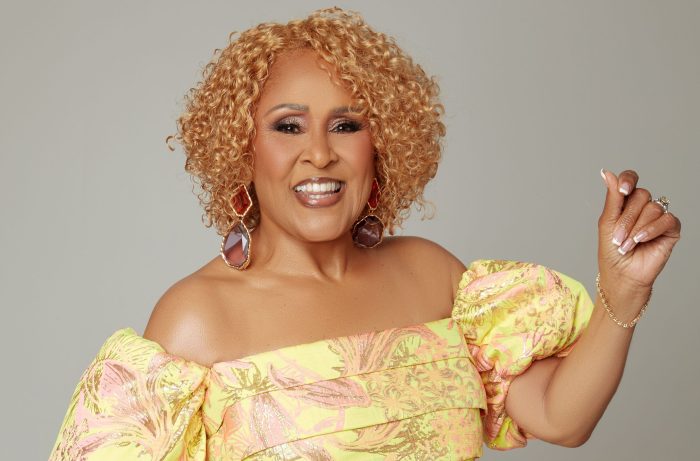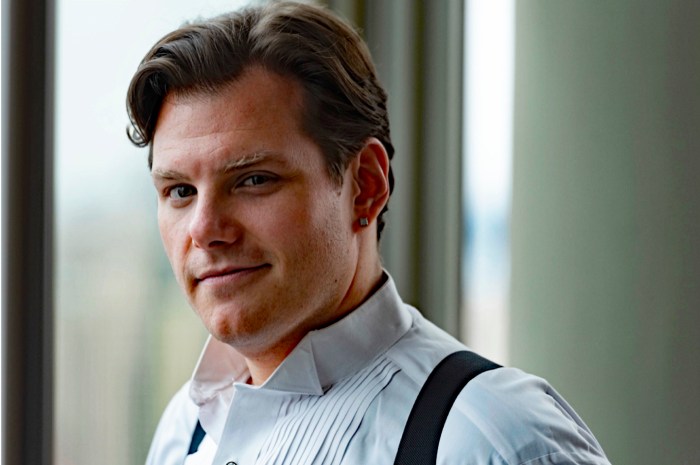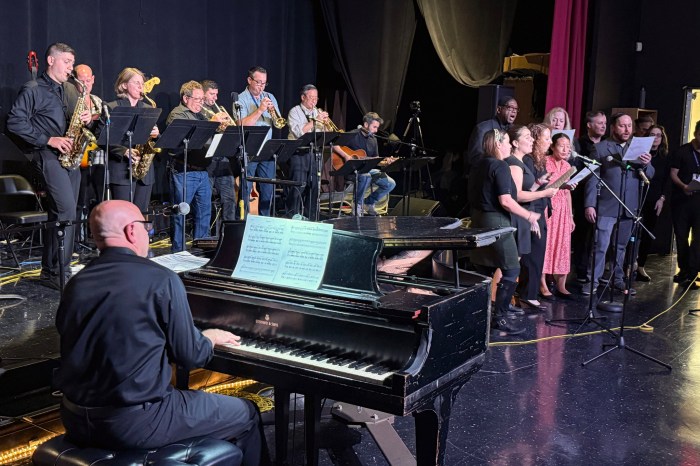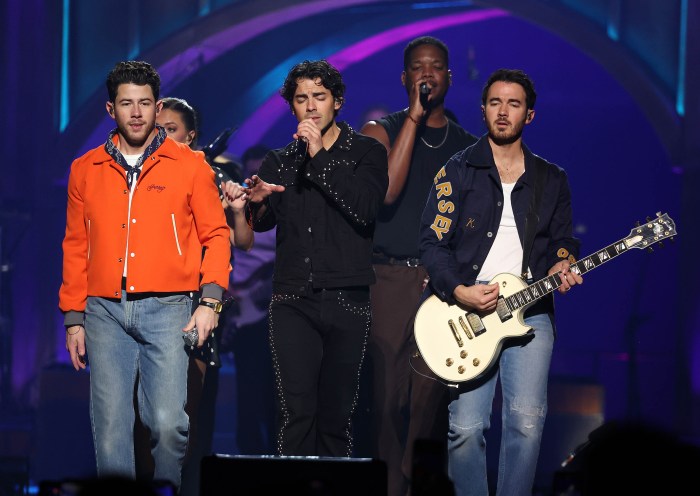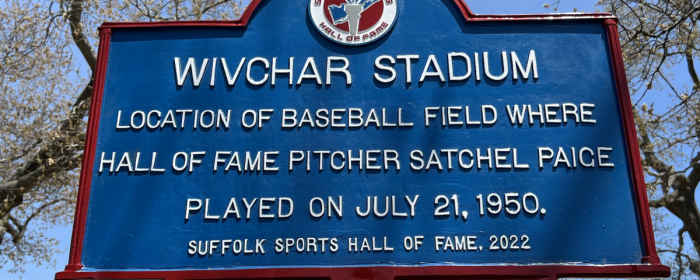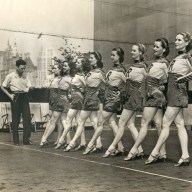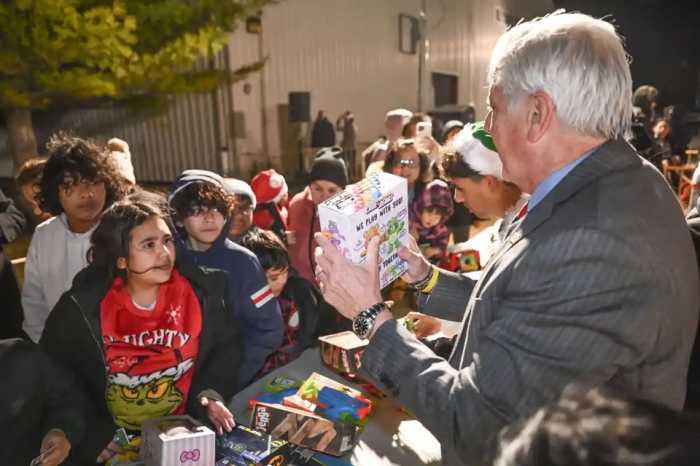As the world comes to some semblance of post-pandemic normalcy, many musicians are embracing the ability to play before live audiences again. None more so than Zach Williams, Kanene Donehey Pipkin and Brian Elmquist of The Lone Bellow. Not unlike many of their peers, the Nashville-by-way-of-Brooklyn outfit did some streaming to connect with fans before deciding to kick it up a notch by booking a number of drive-in dates in late 2021 in which the band would play a number of Northeast dates where fans would travel by car to a drive-in and TLB would play on a stage where a movie screen would normally be.

(Photo by Eric Ryan Anderson)
And while the initial thought would be that this would be the next best thing to a regular concert experience, for Williams and Elmquist, it turned out to be quite the peculiar and unpleasant experience, a realization made all the more concrete following The Lone Bellow coming off a recent stint opening for Maren Morris.
“It sucked real bad and I’d love to never have to play to car windows again for sure,” Williams said. “You’re not allowed to honk so when a song finished, it was just headlights flashing.”
Elmquist added, “People clap with their lights—it’s really weird.”
 And while that part of COVID-19 recovery was far from ideal, the trio, along with touring musicians Jason Pipkin (bass) and Julian Dorio (drums), rebounded by commandeering Roy Orbison’s former home at Old Hickory Lake just outside of Nashville for eight weeks where the quintet recorded the newly released Love Songs for Losers, the band’s fifth full-length album. And while prior albums found the band working with Grammy-winning producer Dave Cobb (2017’s Walk Into a Storm) and Aaron Dessner of The National (2015’s Then Came the Morning; 2020’s Half Moon Light), The Lone Bellow chose to go it alone, handing the lion’s share of production work to Elmquist and Jacob Sooter. It was a true collaborative effort Williams was grateful to have seen his band experience, particularly being able to bring Pipkin and Dorio into the process.
And while that part of COVID-19 recovery was far from ideal, the trio, along with touring musicians Jason Pipkin (bass) and Julian Dorio (drums), rebounded by commandeering Roy Orbison’s former home at Old Hickory Lake just outside of Nashville for eight weeks where the quintet recorded the newly released Love Songs for Losers, the band’s fifth full-length album. And while prior albums found the band working with Grammy-winning producer Dave Cobb (2017’s Walk Into a Storm) and Aaron Dessner of The National (2015’s Then Came the Morning; 2020’s Half Moon Light), The Lone Bellow chose to go it alone, handing the lion’s share of production work to Elmquist and Jacob Sooter. It was a true collaborative effort Williams was grateful to have seen his band experience, particularly being able to bring Pipkin and Dorio into the process.
“Just using our actual band and drummer—it is just a really inspiring and great time,” he said. “Whenever we would use another producer, there’d always be this conversation where the producer would say, ‘You know, I have this drummer that I really like.’ And we’d be like, ‘Okay.’ We’ve had the same band on the road, especially our drummer, for several years now, so we wanted to feel that mojo in the studio.”

(Photo by Ronzoni/CC BY-SA 3.0)
Recording in Orbison’s former abode provided for its share of surreal moments, especially for Elmquist who wound up staying overnight after members of his family contracted COVID-19 (they’re fine now).
“There was one morning at about 4 o’clock in the morning where I swore that Roy Orbison touched me on the hand,” Elmquist recalled. “It was really spooky, living in this 6,000-square foot cabin. Even with friends there, it was spooky.”
And while the specter of the late rock and roll icon may have provided some paranormal nuance to the proceedings, it was the self-described “band camp at Orbison’s house” vibe that made for a singular recording experience that stemmed from Elmquist rhetorically asking, “Wouldn’t it be nice to write a whole record of love songs?” shortly after the band was done releasing Half Moon Light. Although it’s not to say that living on top of each other for two months didn’t create some sparks.
“There has to be friction or you can’t make good things—the friction is what makes the good stuff,” Elmquist explained. “It wasn’t as bad as I thought it was going to be. There were some throw-down moments. We’ve had worse—let’s just say that. I really think everybody knew what their role was and just set their mind to it. When we first started talking about this, I was talking to the manager and I didn’t know if it was going to be good or bad because it could go both ways. It was honestly the easiest and most inspiring time to make the record because we got in that space. We moved the studio there and it was free. It was incredible to be able to do that.”
Don’t expect to hear ditties about chasing women, tooling around in a tricked-out pick-up truck or knocking back six-packs. For this go-round, songs like “Gold,” “Cost of Living” and “Wherever Your Heart Is” deal with grown-up topics like opioid addiction, loss and devotion respectively. The complex subject matter The Lone Bellow has become known for with their material is something Williams proudly acknowledges as being the key to his band’s persona.
“I have a really hard time defining myself or my band,” he said. “The songs that we write are usually not great for pop radio—I know that.”
But for TLB, a major part of the secret sauce in the group’s success is going out, playing live and connecting with their audience. And while it would seem to be an intuitive declaration to make, it’s not one Williams takes lightly.
“I can tell you what’s most important to us at live shows is trying to be in the moment,” he said. “And feeling the energy of what’s going on in the room and what’s not going on and just trying to be aware of that. We find it an honor that people get babysitters, pay for tickets and make a real night out of coming out to see us play our songs and we hope that they become their songs.”
With the band set to play all over the United States through the end of 2022 and well into 2023, that devotion to honoring the covenant between artist and fan is one that Elmquist echoes.
“I don’t think it’s weird to say that we have to protect what we do because we get into a room with people and it’s such a privilege to be able to do it,” he said. “People take the time to see us play and sit for a few hours and we don’t take that lightly. It’s kind of the deal we made with them—if they keep coming, we keep coming. It’s always new. You play a song 1,000 times, but it’s always new because of the people that have made it their songs now.”
The Lone Bellow will be appearing on November 13 at Webster Hall, 125 East 11th St., NYC. Visit www.websterhall.com or call 212-260-4700 for more information.





